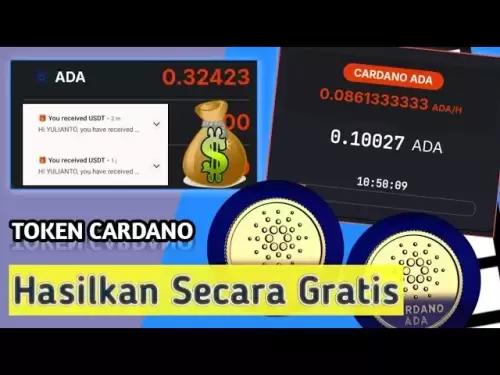 |
|
 |
|
 |
|
 |
|
 |
|
 |
|
 |
|
 |
|
 |
|
 |
|
 |
|
 |
|
 |
|
 |
|
 |
|
Cryptocurrency News Articles
In a Massive Setback, Judge Analisa Torres Denies Both Parties' Request for an Indicative Ruling
May 16, 2025 at 02:36 am
In a massive setback in the long-running XRP lawsuit, Judge Analisa Torres has denied both parties' request for an indicative ruling.
Judge Analisa Torres has denied both parties’ request for an indicative ruling in the long-running case between the U.S. Securities and Exchange Commission (SEC) and crypto firm Ripple, according to a recent filing. The court outlined reasons and cited case laws to back up its decision to reject this motion, which would have ultimately put an end to the legal battle.
Judge Torres Denies Request For Indicative Ruling In XRP Lawsuit
Defense lawyer James Filan announced in an X post that Judge Torres has denied the motion by Ripple and the SEC for an indicative ruling. The court determined that the motion was “procedurally improper.”
As Judge Torres explained, the parties have to make such a request under Federal Rule of Civil Procedure 60(b), which governs motions for relief from a final judgment. The court further remarked that by styling their motion as one for settlement approval, Ripple and the SEC failed to address the heavy burden they must overcome to vacate the injunction and substantially reduce the Civil penalty.
The SEC filed its settlement agreement with Ripple with the court last week. As part of the settlement in the XRP lawsuit, the Commission requested that the court vacate the injunction against Ripple and reduce the monetary judgment to $50 million from $125 million.
However, as Judge Torres noted in her ruling on the motion, relief from judgment under Federal Rule of Civil Procedure is granted “only upon a showing of exceptional circumstances.” She added that both parties have made no effort to satisfy the burden here, as their request doesn’t even mention Rule 60(b).
It is worth mentioning that legal expert Bill Morgan had warned that Judge Torres’ decision on the request was still in the air. He stated that the judge must form a view that the settlement is in the public interest.
What Ripple And The SEC Must Do Next
Legal expert Fred Rispoli explained that Ripple and the SEC will refile the motion under the correct rule. However, commenting on the wording of the court’s decision, he noted that both parties need to get on their knees and beg for the relief as they look to finally settle the XRP lawsuit.
MetaLawMan, another legal expert, had previously warned that it is far from a sure thing that a federal judge would agree to vacate a prior ruling as part of a settlement. He remarked that this was fairly commonplace several years ago, but now, judges have started balking at this in more recent years.
Basically, Judge Torres granting the relief won’t be straightforward even when Ripple and the SEC refile their motion under the correct procedure. She already mentioned that the district court must “determine whether the proposed consent decree is fair and reasonable, with the additional requirement that the public interest would not be disserved in the event that the consent decree includes injunctive relief.”
After Judge Analisa Torres denied both parties’ request for an indicative ruling, Ripple’s Chief Legal Officer (CLO), Stuart Alderoty, spoke about the decision. In an X post, he affirmed that nothing in the order changes his firm’s wins, including the ruling that XRP is not a security.
"No new rulings, no new decisions, just procedural observations," Alderoty clarified. The order stems from a technicality in the parties' request to grant portions of their motion, which they'll be resubmitting.
"The parties are in full agreement to resolve this case and will be making a joint filing to return this matter to Judge Torres to vacate the injunction and reduce the civil penalty."
As reported earlier, Judge Analisa Torres ruled in favor of Ripple in a landmark decision, rejecting the SEC’s claims that the crypto firm’s token, XRP, is a security. The judge determined that XRP sold in exchange for fiat currency on centralized exchanges constituted security transactions, but those sold directly to institutional investors in private placements did not.
However, Judge Torres ultimately granted the SEC’s request for an injunction against Ripple, imposing a hefty civil penalty of $125,000. In contrast, the SEC sought a minimal penalty of $50,000 to be imposed on Ripple.
Following this ruling, the SEC appealed Judge Torres’ decision on the institutional investors, while Ripple expressed interest in appealing the ruling on the injunction and the penalty.
Despite the appeals, the SEC and Ripple later reached a settlement agreement, which was submitted to the judge last week. As part of the settlement, the SEC requested that Judge Torres vacate the injunction and reduce the monetary judgment to $50 million from $125 million.
The judge decided to deny this request, highlighting that the parties failed to satisfy the burden for obtaining such relief. Judge Torres pointed out that the request to absolve Ripple of some of its obligation to cease the illegal sale of securities and pay the full civil penalty amounts to a motion to vacate significant portions of the final judgment.
This request should have been made under Federal Rule of Civil Procedure 60(b) and not Rule 60(c), which
Disclaimer:info@kdj.com
The information provided is not trading advice. kdj.com does not assume any responsibility for any investments made based on the information provided in this article. Cryptocurrencies are highly volatile and it is highly recommended that you invest with caution after thorough research!
If you believe that the content used on this website infringes your copyright, please contact us immediately (info@kdj.com) and we will delete it promptly.
-

-

-

- HashKey Chain integration with KuCoin exchange is now live. Users can directly withdraw $HSK tokens to the HashKey Chain mainnet.
- May 16, 2025 at 05:00 pm
- This allows seamless participation in the growing on-chain real-world asset (RWA) ecosystem. At the same time, KuCoin has activated deposits and withdrawals for the KCS token via both the ERC20 and KCC networks
-

-

-

-

-

-


























































